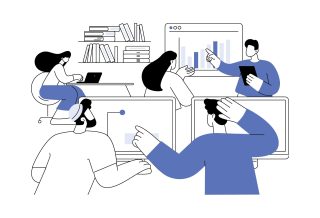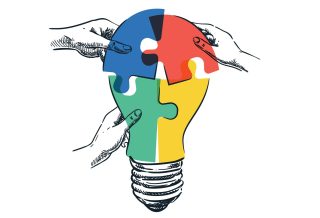IDEAS
Double the learning potential
By Timothy Boerst, Meghan Shaughnessy and Meri Tenney-Muirhead
Categories: Coaching, Continuous improvement, Facilitation, Learning designs, Learning systems/planning, Mentoring & induction, Personalization, TechnologyAugust 2020
Vol. 41, No. 4
Read the remaining content with membership access. Join or log in below to continue.
Sed ut perspiciatis unde omnis iste natus error sit voluptatem accusantium doloremque laudantium, totam rem aperiam, eaque ipsa quae ab illo inventore veritatis et quasi architecto beatae vitae dicta sunt explicabo. Nemo enim ipsam voluptatem quia voluptas sit aspernatur aut odit aut fugit, sed quia consequuntur magni dolores eos qui ratione voluptatem sequi nesciunt. Neque porro quisquam est, qui dolorem ipsum quia dolor sit amet, consectetur, adipisci velit, sed quia non numquam eius modi tempora incidunt ut labore et dolore magnam aliquam quaerat voluptatem.
References
Brouwer, N. (2011). Imaging teacher learning: A literature review on the use of digital video for preservice teacher education and professional development. Paper presented at the annual meeting of the American Educational Research Association, New Orleans, LA.
Cohen, D.K., Raudenbush, S., & Ball, D.L. (2003). Resources, instruction, and research. Educational Evaluation and Policy Analysis, 25(2), 119-142.
Feiman-Nemser, S. (2001). Helping novices learn to teach: Lessons from an exemplary support teacher. Journal of Teacher Education, 52(1), 17-30.
Heaton, R. (2000). Teaching mathematics to the new standards: Relearning the dance. Teachers College Press.
Lampert, M. (2001). Teaching problems and the problems of teaching. Yale University Press.
Lampert, M. & Ball, D.L. (1998). Teaching, multimedia and mathematics: Investigations of real practice. Teachers College Press.
Lawson, S. & Wood-Griffiths, S. (2019). Mentoring design and technology teachers in the secondary school. Routledge.
Leinhardt, G. (2010). Introduction: Explaining instructional explanations. In M.K. Stein & L. Kucan (Eds.), Instructional explanations in the disciplines (pp. 1-5). Springer.
Leinhardt, G., Putnam, R.T., Stein, M.K., & Baxter, J. (1991). Where subject knowledge matters. In J. Brophy (Ed.), Advances in research on teaching (Vol. 2, pp. 87-113). JAI Press.
Sherin, M. (2000). Viewing teaching on videotape. Educational leadership, 57(8), 36-38.
Silver, E.A. (2009). Toward a more complete understanding of practice-based professional development for mathematics teachers. In R. Even & D.L. Ball (Eds.), The professional education and development of teachers of mathematics: The 15th ICMI Study. Springer.
Categories: Coaching, Continuous improvement, Facilitation, Learning designs, Learning systems/planning, Mentoring & induction, Personalization, Technology
Recent Issues
LEARNING DESIGNS
February 2025
How we learn influences what we learn. This issue shares essential...
BUILDING BRIDGES
December 2024
Students benefit when educators bridge the continuum of professional...
CURRICULUM-BASED PROFESSIONAL LEARNING
October 2024
High-quality curriculum requires skilled educators to put it into...
LEARNING TO PIVOT
August 2024
Sometimes new information and situations call for major change. This issue...












